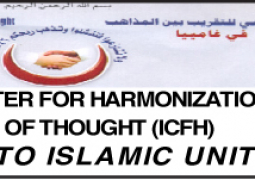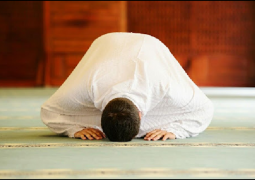
One who sleeps through the time of a prayer or who forgets a prayer may make azhan and iqamah when he desires to pray. In a story recorded by Abu Dawud, when the Prophet, upon whom be peace, and his companions slept through the time of the morning prayer, he ordered Bilal to make the azhan and iqamah for the prayer.
If one has missed many prayers, it is preferred to make one azhan at the beginning followed by an iqamah for each prayer. Says al-’Athram, “I heard Abu ‘Abdullah (Ahmad) being asked what a man who had missed a prayer should do about the azhan. He mentioned the hadith of Hushaim from Abu az-Zubair...that the idol-worshippers kept the Prophet busy during four of his prayers during the Battle of the Clans. When part of the night had passed, he ordered Bilal to make the azhan and the iqamah and they prayed the afternoon, sunset, and night prayers in succession, each time followed by the iqamah.
The Azhan and Iqamah for Women
Said Ibn ‘Umar, “There is no azhan or iqamah for women.” (Related by al-Baihaqi with a sahih chain.) This was the opinion of Anas, al-Hassan, Ibn Sireen, an-Nakha’i, al-Thauri, Malik, Abu Thaur and the people of “juristic reasoning.” Ash-Shaifi, Ishaq and Ahmad said if they make the iqamah and azhan, there is no problem. It is related from ‘Aishah that she would make the azhan and iqamah and lead the women in prayer, standing in the middle of the row. (Related by al-Baihaqi.)
Entering the Mosque After the Prayer Is Finished
The author of al-Mughni states, “If one enters the mosque after the prayer is finished, he may make the azhan and iqamah. Ahmad’s practice, based on what al-’Athram and Sa’eed ibn Mansur recorded from Anas, was to ask a person to make the azhan and iqamah, after which he would pray with (some people) in congregation. If a person wishes, he may pray without making the azhan and iqamah. Says ‘Urwa, “If you reach a mosque wherein the people have already prayed, you may base your prayer on their azhan and iqamah, as theirs are sufficient for those who come after them.” This was the opinion of al-Hassan, ash-Sha’bi and an-Nakha’i. Al-Hassan, however, said, “I prefer that he makes the iqamah. If he makes the azhan, he should do so in a low voice and not aloud, for some people may consider it out of place.”
The Time Between the Iqamah and the Prayer
It is permitted to talk between the iqamah and the prayer. One need not repeat the iqamah, even if the interval is long. Reported Anas ibn Malik, “The iqamah was made while the Messenger of Allah was talking to a man in the corner of the mosque. He did not come to the prayer until the people had fallen asleep.” (Related by al-Bukhari) One time, the Messenger of Allah, upon whom be peace, remembered that he was in post-sex impurity after the iqamah had been made, so he went to make ghusl and came back to lead the prayer without (a new) iqamah.
The Iqamah of One Who Is Not the Designated Caller
If someone other than the appointed caller wants to make the azhan, he must obtain the latter’s permission. If the appointed or regular caller is late and they fear that they will miss the time of the azhan, another person may make the call.
Extraneous Additions to the Azhan
The azhan is a form of worship. Muslims are not allowed to add or subtract anything from it. There is an authentic hadith which states, “Whoever introduces something to this affair of ours will have it rejected.” We will discuss some of these acts here:
The caller saying, “I bear witness that our leader (Muhammad) is the Messenger of Allah.” Ibn Hajr is of the opinion that the word ‘leader’ may not be added, although it is permissible on other occasions.
Shaikh Isma’il al-’Ajluni records in Kashfal-Khafa’, “Wiping the eyes with the index fingers and then kissing them after hearing the caller say ‘I bear witness that Muhammad is the messenger of Allah,’ and with the listener saying, ‘I bear witness that Muhammad is His slave and messenger. I am pleased with Allah as Lord, with Islam as religion, and with Muhammad as the Prophet,” is based on ad-Dailami’s report from Abu Bakr that when he heard the caller say, “I bear witness that Muhammad is the Messenger of Allah,” he would say the same, kiss the inside of his index fingers and wipe his eyes. The Prophet then said, “Whoever does what my friend (Abu Bakr) did, then my intercession will be permissible for him.” In al-Maqasid it says, “This is not true. And what Abu Bakr ar-Raddad al-Yamani al-Mutasawaf recorded in Mujibat ar-Rahmah wa Aza’im al-Maghfirah is not true. Its chain is of
unknown narrators and, moreover, the chain is broken.” There is another report of equally dubious import from al-Khidrs and mentioned in the preceding book: “Whoever says, upon hearing the caller say, ‘I bear witness that Muhammad is the Messenger of Allah,’ ‘Welcome O my love and the coolness of my eyes, Muhammad ibn ‘Abdullah, upon whom be peace,’ and then kisses his index fingers and wipes his eye with them, he will never go blind; nor will he never be afflicted with an eye infection.”’ None of these practices can be attributed to the Prophet or his companions.
Singing the Azhan
To “sing” the azhan or to state it in improper Arabic by adding a letter or lengthening the sound of a vowel, and so on, is disliked. If it changes or obscures the meaning of what is said, it becomes forbidden.
Reported Yahya al-Baka’, “I saw Ibn ‘Umar say to a man, ‘I am mad at you for the sake of Allah.’ Then he said to his companions, ‘He sings in making his azhan, and he takes wages for it.”’
Zhikr and Azhan
Making zhikr, supplications, and practices of a similar nature before the morning azhan are innovations to the Sunnah. In al-Iqna and its commentary, a book of Hanbali fiqh, it is stated, “What some callers do before the morning azhan (i.e. zhikr, chanting, loud supplications and so on) are not part of the sunnah. No scholar has said that it is preferred to do such acts. In fact, they are hateful innovations introduced after the time of the Prophet and his companions. No one is to order such acts, and no one is to blame one who avoids such acts. If one has left money for such acts, it is not permissible to use it for those acts, as they contradict the sunnah. In Talbis Iblis by Ibn al-Jauzi, it states, “I have seen people staying up a part of the night on the minaret admonishing the people, making zhikr and reciting the Qur’an in a loud voice. They keep people from sleeping and disturb those who are making late-night prayers. These are rejected and evil actions.” Ibn Hajr says in Fath al-Bari, “What is done in the way of zhikr before the morning azhan, the Friday prayers and the prayers for the Prophet is derived neither from the azhan nor from the Islamic law.



